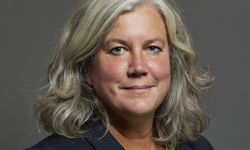
Cop27 – it’s all about us
Losing sight of the big picture
In the 1980s, Steve Bochco developed a new formula for television drama with Hill Street Blues. It came in three or four layers: an overarching chronicle for the entire franchise with standalone stories for each episode, plus a narrative arc for the season and occasional little ‘miniseries’ plotlines that ran over three or four programmes.
Everyone does a version of that now, but it was quite the innovation then.
The news agenda is a bit like that: air crashes burst on to the front pages and then disappear inside; court cases grab headlines for a few days; wars dominate for a few weeks. But, just as the central characters and the long thread in the background are key to the Bochco formula – the things that make us invest in the show and keep watching – so it is with news agenda: the politicians, the celebrities, the royals.
The 80s were a rich time for this style of American television: LA Law (also Bochco), St Elsewhere, ER and others adopted the formula and Britain followed. Casualty is still going to this day. But in later seasons, many of those landmark shows lost their force and degenerated into conventional soap opera. The “big story” of the episode became a sideshow to the on-off, love-hate relationships of the main characters; the “miniseries” element that used to examine issues about policing or doctoring or society was instead devoted to the stars’ family troubles – still addressing issues, but ones that were being aired all over the place. Instead of looking at the world through a wider lens, through outside characters that would bring new and different perspectives, everything started to be channelled through the eyes of the core team. Because they were the people the viewers were interested in and cared about. It all became narrower, more trivial and, at worst, preposterous.
That is what has happened to our newspapers over the past few years. The ‘heavies’ have always focused on politics – but in the past, they were more concerned with policy than politicians. Since the referendum, the whitetops have joined in, force-feeding readers who really didn’t care month after month of Brexit, followed by year after year of Conservative turmoil. And because the editors know readers don’t care, they have to shout to convince them “This Matters”, becoming ever more strident, ever more narrow in their approach. Meanwhile, the redtops’ alternative is a diet of premier league footballers, reality TV stars and old criminals.
Of course, there have been interruptions to this flow. Covid took out more than a year of normal life and ‘normal’ news and then came the invasion of Ukraine, which dominated the front pages for at least a month in the spring. That appetite has waned, but we know it shouldn’t. We see pictures of bombed cities, hear about Russian offensives and Ukrainian fightbacks, but we pay less heed to the people who have lost their lives, livelihoods and homes. The central concern about the war now is not freedom and democracy and world stability, but how it’s making it more expensive for someone in Sunderland to cook a family dinner. Which matters too.
The danger in this approach is that we lose sight of the big picture and with it the astuteness and agility to recognise and react to events and developments that deviate from our proscribed agenda. We do still see “news” when it breaks, but we force-fit our response to it into a preset pattern. And we can be blind to the biggest stories because they are happening all around us all the time.
Which brings me to the biggest story of all: the one about our very existence.
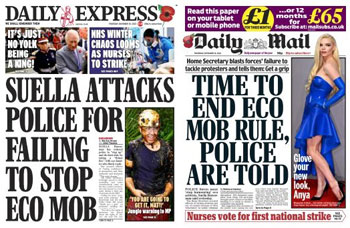
What on earth can we do to get our newspapers to grasp the fact that the planet is in mortal danger? There is absolutely nothing that matters more today than global warming. The evidence is there right in front of us. Not just far away in Pakistan, drowning under metres of flood water, in remote island states battered by hurricanes, or in South American forests blazing with wildfires, but here in Europe, where the weather maps now show great swaths of red, and Britain, where we saw record high temperatures in July and record minimum temperatures for November last night (14C when the norm is 3). Yet the climate sceptics are still given sway in their columns, while editors and their leader-writing teams demand draconian punishments for ‘ecowarriors’ who disrupt life for an hour or so, and insist that we ‘can’t afford’ an extra green levy when we pay for our heating or buy petrol.
And then the previous prime minister vetoes advice on energy conservation (energy conservation out of immediate self-interest to spare ourselves from expensive bills, not out of long-term self-interest to spare ourselves from Armageddon) because that would be “nanny statism”. Great heavens, Jacob Rees-Mogg was right on that at least. Boris Johnson got so much wrong, but he understood climate change and now every move he made to try to mitigate it is being reversed. The Daily Mail writes about the “obsession” with “the race to” net zero as though that were a bad thing. It is a race – and one the planet is losing.
You may have noticed that Johnson turned up in Sharm el-Sheikh for Cop27 this week. The King was banned by Liz Truss and Rishi Sunak had more pressing concerns at home. But then suddenly he didn’t.
Let’s not get into the motives of any of the three prime ministers we’ve had over the past five months; at least two of them managed to make it to Egypt when it looked for a while that the Britain that had made great capital out of hosting Cop26 in Glasgow didn’t care now it wasn’t star of the show.
Sunak made a brief speech, saying it was necessary to tackle climate change ‘to protect the world economy’ (not to protect the world?); Johnson had a pop at Truss about fracking, said there should be no ‘wibbling and wobbling’ over net zero and admitted that Britain had pumped an awful lot of carbon into the atmosphere over the centuries. It could not, however, afford the sorts of reparations to poorer countries that had been suggested at the conference.
There were more compelling speakers. The UN Secretary-General António Guterres said the world was on the highway to climate hell with its foot on the accelerator; the Barbadian prime minister Mia Mottley called for fossil fuel giants to be brought into discussions and urged to do their bit: ‘How do companies make $200 billion in profits in the last three months, and not expect to contribute at least 10 cents in each dollar of profit to a loss and damage fund?’
Who picks up the bill?
Someone has got to pay. The poorest countries, which did little to cause global warming, are suffering most from its effects and they simply can’t afford the costs involved in combating it. Richer countries have a choice about how to spend their wealth; the climate victims don’t have the money to start with. (A television news bulletin this week showing the flood devastation in Pakistan said the government had put the cost of the disaster at $40bn. That’s about £35bn at today’s exchange rate, which doesn’t seem such a huge sum for the developed world to find when you think that we spent £37bn on test and trace – not to mention the £9bn we wasted on unusable PPE and the £4bn we lost to Covid fraud.)
Yes, Cop27 is a talking shop. Just as Davos is a talking shop. But it is important that world leaders are gathering to try to work together. So how did our newspapers tackle the subject on the day of our prime minister’s flying visit?
Missing the main story
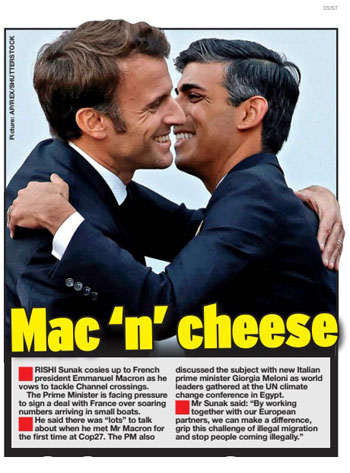
The Daily Star went really big. It ran a photograph of Sunak and Emmanuel Macron on page 2 with the headline ‘Mac ‘n’ cheese’. The four-par story was about talks on stopping small boats crossing the Channel. The only mention of global warming in the entire paper was the fact that the leaders’ hug took place “at the UN climate change conference in Egypt”.
The Express, Telegraph, Times and Metro all used the hug picture on their fronts, three out of four of them to illustrate a story about migrants / asylum-seekers / refugees – choose your own terminology; newspaper shorthand is always ‘migrants’ as in the Express splash: ‘Rishi: I will get grip on migrant crisis’.
Metro went in a different direction, leading on Sunak’s ‘Sharm offensive’. This majored on the international glad-handing (the Guardian said he was widely shunned), but had a good chunk of climate change stuff along the way and the little boats secondary. There was more of that inside, with a bit of Johnson.
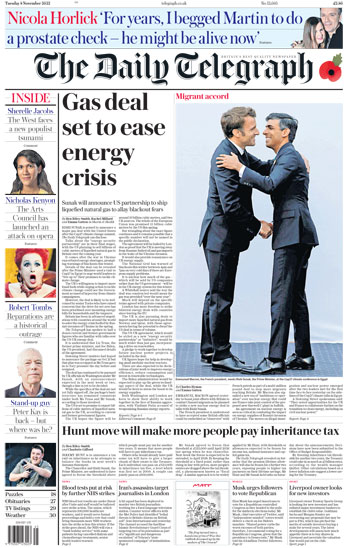
The Telegraph also ran a splash loosely based on Cop27, but focused on a putative deal with the US to protect gas supplies. Its inside coverage was tangled up with other politics and came down to three stories: Johnson’s speech, China emitting more carbon than us, and people at the conference complaining that they weren’t getting enough to eat.
The Express had a spread on the boat people, followed by another on the climate conference, which was dominated by Johnson. Britain couldn’t afford reparations, but we were leading the way with green shipping lanes. The Times’s inside spread was similarly insular. The lead was a 700-word wrap, with Sunak’s speech the main headline, and there was a small double on Johnson – the only other news story. Besides those, there was a Q&A, a sketch, and a commentary on data-gathering, lifted from the Wall Street Journal, by the author of a book called ‘False Alarm: How Climate Change Panic Costs Us Trillions, Hurts the Poor, and Fails to Fix the Planet’. The Times did at least put this ahead of, rather than behind, its migration spread. And there was a leader urging action.
No space on the front
Neither the Mirror nor the Sun had room for the conference in any guise on their fronts. The Mirror reported Sunak’s speech on page 18, alongside Just Stop Oil activists disrupting the M25; the Sun had four short stories on page 6 – leading on Johnson – and kept the Sunak-Macron boat people element separate on page 2.
A wider view
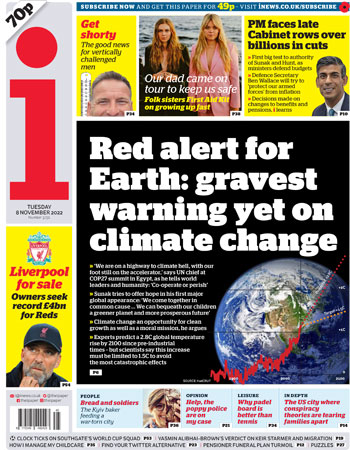
The FT, Guardian and i all took a wider view. The FT had the UN alert as its second lead, while the Guardian and i both splashed on the conference - with the focus firmly on the warnings of catastrophe, developed countries’ culpability and what should be done next. They both ran two spreads inside.
The Guardian put the Sunak-Macron picture across its first, but gave little text space to his contribution, concentrating instead on issues outside the conference centre, including a report on disappearing glaciers.
The i made Sunak the lead to the first spread, with a big chunk on Johnson, and then devoted the second to other activities in the hall, including a look at the young activists taking some of the burden from Greta Thunberg.
A sceptical view

And then there was the Mail. The day before, it had led on ‘Red Ed: UK must pay climate change damages’, turning to an inside spread where Ross Clark asked ‘Has anyone caused as much damage to the British economy as Ed Miliband?’ – contrary to John Rentoul’s convention, a question to which even the most dyed-in-the-wool Conservatives would have to answer ‘Yes’.
Now it was again leading on climate, but again in full sceptical mode: ‘Just what planet are they on!’ As on the previous day, the story, which said that Britain was being asked for £1 trillion, turned to an inside spread. Here the main headline was based on Johnson’s statement that ‘No country can afford such vast reparations’. There was a second report of Johnson’s speech and a little double asking ‘Are delegates being spied on?’
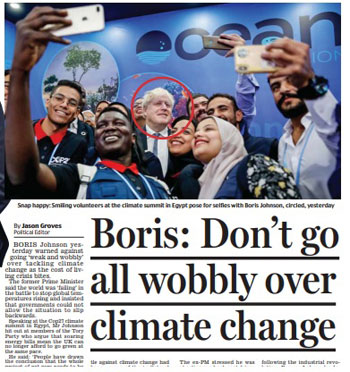
There were two surprises on this spread: the first was that the Mail had conducted a poll and 98% of respondents had said we should not pay any ‘climate damages’ at all to other countries. Who could have predicted such a strong response? The second was that the paper found it necessary to put a red circle round Boris Johnson’s head in its photograph of him posing for a selfie with a group of conference-goers. How quickly it thinks we forget.
Meanwhile, Sunak ‘securing a landmark migrant deal with Macron’ (has he really?) was kept separate on page 2.
Parochialism rules
The point of all this is that the vast bulk of our press coverage of Cop27 was not about climate change, but about ‘us’: a three-minute speech from a prime minister who didn’t want to be there and a scene-stealing contribution from a former prime minister who wanted to upstage the man blamed for his removal. This is the biggest issue by far facing the world today and we revert to parochialism.
But maybe this was because Cop27 was never expected to produce the great international agreements that were supposed to come out of last year’s bash in Glasgow. Maybe that was all it was worth?
The online dimension
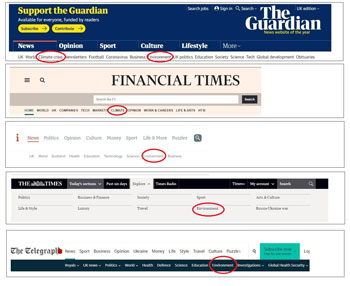
To test that theory, I took a look at the papers’ websites, where they have far more space to spread their wings, to see how much importance they attach to the environment and climate change.
First stop was the home page and the menu near the search bar. Only the Guardian and the FT have ‘climate’ immediately visible without any further clicking.
The Guardian has a main menu of News, Opinion, Culture, Lifestyle and More. It defaults to news, with its sub-menu of UK, World, Climate crisis, Newsletters, Football, Coronavirus, Business, Environment, UK politics and a few more.
FT comes straight in with a top-level choice of World, UK, Companies, Tech, Markets, Climate, Opinion…
The Times doesn’t have a menu of topics, but instead offers ‘Today’s sections’, ‘Past six days’, ‘Explore’ and ‘Times Radio’. If you click on Explore, ‘Environment’ is one of the ten options. Others include Politics, Business and finance, Sport, Luxury, Travel and the Ukraine-Russia war.
The i and Telegraph (which has Ukraine in its top-level menu) both have Environment as a second-tier option in the News section.
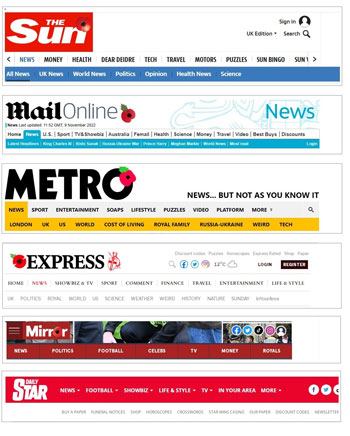
None of the others has a dedicated environment or climate section. Some have ‘Science’ or ‘Nature’, but these provide stories about red moons, spacemen and dogs that can’t balance on their bendy legs. They do, however, have tabs for ‘Royals’ (as does the Telegraph – the first one in its News sub-menu), ‘Celebs’, ‘Weird’, ‘Tech’ and even ‘History’.
These tabs are not created by people exercising editorial judgment; they are the result of algorithms that tell web managers what are the most popular subjects; which get the most clicks.
We are caught in a vicious circle. People ‘aren’t interested’, so journalists don’t produce the stories for a click-dominated news world, so people don’t know, so they’re not interested and so it goes on.
But we do know that people do care. It does matter. We really do need to sort this out and find a way to make the general reader interested. Starting with taking it seriously ourselves. David Attenborough and the Guardian can’t save the planet on their own.
We’re a compassionate country…

Our newspapers were more interested in the apparent Macron-Sunak rapprochement because migration is back in the news. There was the firebombing of one asylum centre – later officially described as a terrorist attack, although papers reporting at the time carefully avoided suggesting it was any such thing – and the overcrowding and disease at another.
But these weren’t the issues that got the editors’ juices running. No. It was a Home Office report on the huge numbers of Albanians crossing the Channel in small boats. A surge that Suella Braverman described as an invasion.
That choice of word shocked MPs on both sides of the House, refugee organisations and some international onlookers. But for sections of the Press – and Nigel Farage – she was simply telling it how it was. Last week saw an avalanche of stories about the ‘migrant crisis’, drug barons, organised criminals and Mr Bigs with £150,000 cars with personalised number plates. ‘Economic migrants’ were being ferried around in posh cars to luxury hotels fit for Meghan or the Downton Abbey family and then having the cheek to complain about the food. The language in some has been every bit as hostile and sometimes as intemperate as that of the Home Secretary. I really, really wish everyone would stop talking and writing about people being ‘processed’.
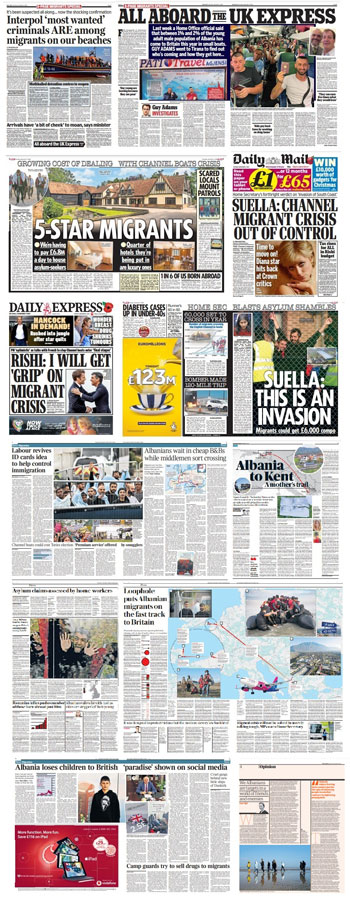
Listening to the radio on the day that Home Office report came out, I found myself in the unusual position of agreeing with Farage. Albania is a safe European country, it is not at war, why did its young men need to come here? What I didn’t know – and what that news bulletin didn’t tell me – was that, when they get round to dealing with them, officials here actually grant a high proportion of asylum applications from Albanians. So there must be some valid reasons.
The Mail, Mail on Sunday, Times, Sunday Times, Guardian and Observer all got on the case, despatching ‘special teams’ to Albania to find out what was going on. Some found wealthy gangsters, others found abject poverty, all found communities dying through the loss of their young people. I guess it all depends what you’re looking for.
The Mirror, which shunned almost all immigration stories when most of Fleet Street was going bonkers on the subject before the 2016 referendum, continues, for the most part, to look away – seeing the Channel boats ‘crisis’ more as a stick with which to beat the government in general and Braverman in particular than something that should worry its readers.
But people are worried about this influx. Because their fears are being stoked and they are not being given complete information. A woman in Kent, interviewed on television last week, said she daren’t go out of the house because of the asylum camp nearby. She thought nasty people might escape and break in. Why would she think that? Has it happened? Or had she read the Sun story headlined ‘Lock your doors to stop migrants sneaking inside’?
It must be disconcerting for people in Kent and an absolute nightmare for local authorities having to cope with the fallout. There are issues to be addressed. But a bit of context and some cold hard facts would not go amiss.
The Mirror did at least make a game attempt at an explainer on its oped page and Scotland on Sunday did even better with a three-page Q&A. The Times carried a chart showing the rise in the number of boats landing on Kent beaches, but it didn’t set that against the decline in the number of people arriving in the backs of lorries.
Well it couldn’t, could it? Because we will never know how many arrived that way. In the fevered pre-referendum atmosphere of 2016, the Express told us that ‘thousands’ of asylum-seekers had gone missing in the UK – and they were ‘just the ones we know about’. The previous year, a Daily Mail splash reported that 350 had been ‘turfed off’ lorries from Calais in just four hours. The whole tone at the time was that the situation was out of control, that we hadn’t a clue how many foreigners were ‘invading’ – yes, they frequently used that word – our country.
Now we have a better idea. The figures are frightening when you see the way they have increased: the number of people landing on small boats has risen from 300 in 2018 to 28,500 last year – with that number passed by September of this year. But we can count these people in the way we couldn’t those in lorries. We don’t know if these are on top of those in containers (unlikely) or that the route ‘of choice’ has changed.
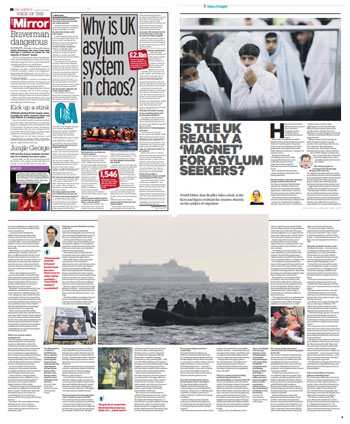
And are these volumes of people manageable? No one wants anyone to risk their lives on a rubber dinghy or to be the victims of people traffickers, modern slavemasters or criminal gangs. Of course, we should deter them – and those who profit from endangering vulnerable people’s lives. If they were allowed to make their way here by ‘legal’ channels (which have all been closed) to press their case, would that help or make matters worse? Would the country fall apart? Would it open a floodgate?
I don’t know the answers to any of these questions. But I would like more journalists to be asking them – and of people without a political axe to grind.
What I do know, from official statistics, is that our population of 65-odd million includes 140,000 refugees and stateless people, while a further 83,000 are waiting for their asylum applications to be considered. According to the UNHCR, Turkey, with a population of about 80m, has the most refugees: 3.7m. Colombia has 2.5m and Germany is third in this league table with 2.2m – that’s 15 times as many as us and twice as many as the next in the list: Pakistan – the country devastated by flooding that needs $40bn to rebuild.
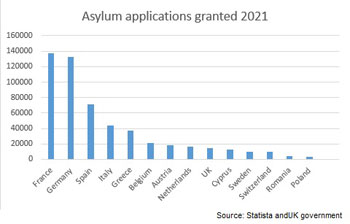
And here’s another table, showing the number of asylum applications granted by various European countries last year. France tops this one with 137,015 – almost as many as the total number of refugees living here – followed by Germany, Spain, Italy and Greece. Our government says that just under 15,000 people were granted refugee status or protection here in 2021.
We keep hearing people say, ‘We’re a compassionate country, we’re doing our bit.’ But are we? If we don’t think we can do more, for whatever reason, then let’s at least be honest in acknowledging that others with problems of their own are doing quite a bit more.
Could it possibly be him?
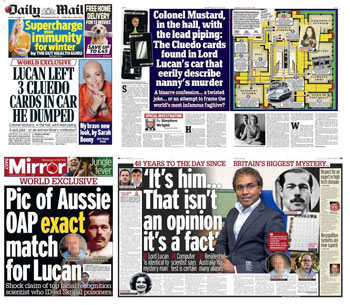
I have remarked before on how extraordinary it is that there always seems to be a startling new development in the Madeleine McCann case around the anniversary of her disappearance in May.
Well, it seems she is not the only missing person to be the subject of this phenomenon.
Lord Lucan went missing 48 years ago this week after murdering his children’s nanny, Sandra Revitt. And, what do you know?, both the Mail and the Mirror have uncovered startling new developments. The Mail reports that three cards – Colonel Mustard in the hall with the lead piping – from his home Cluedo set were found in a car he had abandoned. Lucan apparently thought he resembled the colonel and Ms Revitt was battered to death. This is a World Exclusive.
The Mirror has meanwhile found someone who believes the missing lord, now 87, is living as a Buddhist in Australia. The ‘facial recognition scientist who identified the Skripol poisoners’ is absolutely sure the man in Oz is Lucan. ‘It’s him,’ he says. ‘This isn’t opinion, it’s fact.’
Right.
The Mirror is so convinced that it has on its front page a clear photograph of Lucan and a pixellated (for legal reasons) photograph of ‘the man in Australia’ that, for all the use it is to the reader, might just as well be a picture of Skippy the bush kangaroo.
The Daily Star went on to report that bookies were no longer taking bets on Lucan being found alive.
Right.
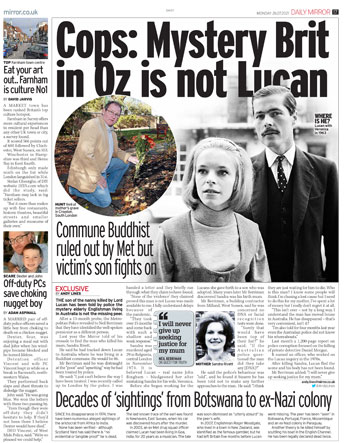
These may be amazing breakthroughs in a case nearly half a century old and it may be mere coincidence that they should surface in the week (in the Mirror’s case on the very day) of the anniversary. It is strange, though, that the paper should now be so sure that they’ve got their fugitive a year after reporting that British police had concluded that the man in an Australian Buddhist colony was not Lucan. Maybe they were wrong.
Seems to me the thing to do is for the Mirror to run the photograph unpixellated. If the subject sues for libel. It could then, as part of its defence, perhaps ask for him to take a DNA test to prove that he isn’t the man the paper says he is.
Mystery solved.
A big story, roundly ignored

The Sunday Times had a stonker of a splash last week on ‘the global hacking network that targets VIPs’. Those targets identified by the Insight team, led by the multi-award-winning Jonathan Calvert, included the former chancellor Philip Hammond, the BBC’s political editor Chris Mason and the disgraced French footballer-turned FIFA chief Michel Platini.
Calvert and co appear, in modern parlance, to have ‘kept all the receipts’ after what was, in these days, a rare investment in investigative journalism. One of the people named in the splash-and-spread coverage has made a legal complaint, as noted at the top of the story if you try to access it online.
Even with that alert, I’m surprised – and dismayed – that only the Express picked up the story. It should have made waves, not ripples.
I guess everyone was too busy writing about that other former minister, Matt Hancock.
A tale of two MPs

It really does beggar belief the number of trees that have been felled to print rubbish about Hancock taking part in a TV reality show. And it wasn’t just the tabs – the Guardian, Times and Telegraph all speculated on how he’d get on in the jungle.
Yes, it’s outrageous that a man many hold at least partly responsible for the deaths of their loved ones should be seeking rehabilitation is such a craven way. Yes, it’s outrageous that a man who is being paid to work for his constituents should bunk off to trouser half a million quid - at least some of which will presumably find its way to a dyslexia charity.
But, hang on a minute, didn’t the MP for Uxbridge bunk off to America to earn £150,000 for a single speech rather than turn up in Westminster last month? And didn’t he follow that with a freebie holiday in the Caribbean? I didn’t notice that being condemned by the papers now accusing Hancock of deserting his constituents.
I don’t condone Hancock’s life decisions, but sauce for the goose and all that…
And I know the Sun makes a speciality of groany puns, but these two on successive days? Honestly?

Front page of the fortnight
Talking of Hancock, while the Sunday Times splash was probably my favourite bit of journalism of the past couple of weeks, I did like this front from Metro, combining two ex-ministers yesterday.
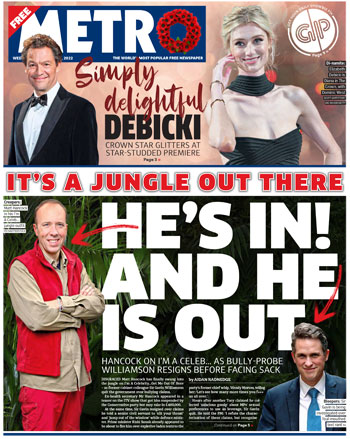
Liz Gerard’s Notebook is a fortnightly column published in the InPubWeekly newsletter. To be added to the mailing list, enter your email address here.











